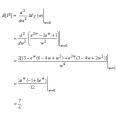Risque business
When in walks a very savvy looking kinda bloke, with a big wad of notes and wants in. Do you reckon it would change the character of the game? You betcha it would.
In ways I cannot put together in a coherent, scholarly study, I have noticed a distinct change in the character of the equity markets over the last decade. It is becoming dominated by big, lightning quick money. Oh, the Big Boys have always had a major impact, and in that regard there is nothing new. They've always enjoyed their power to push the market this way or that. They've always enjoyed a clubiness that allowed for information to be shared in ways that didn't quite pass the "insider trading" bright lines. But they usually bought stuff to own it, to manage it, to work it, to put it in thieir trophy room.

But these new guys are not just big bullies; they're bold, cold Matrix-like machines. Just listen to CNBC at the number of times they mention how dominant block trading has become. Do you remember the term "hedge fund" being common parlance more than a decade ago? What about "black box" trading?
A black box is not some fatcat in a pin-striped suit and a big cigar. It is a streak of cyberdata, a stateless, motherless virus hellbent to ambush, arbitrage and retreat faster than a ninja. And they are everywhere, in to everything. Their bytes permeate every conceivable market, like a monstrous whale seiving the nutirients and little, bottom-of-the-food-chain
 investors and small players from the oceans of cash that trade the world's goods. They derive their gains from diverse derivatives of incalculable numbers and varieties, trading the shadows of what used to be a currency or a commodity or a stock or a bond, but now come under the most obtuse and arcane of names that only financial rocket scientists can understand. Their trade is in ideas and concepts and notions and algorithms, not things and companies.
investors and small players from the oceans of cash that trade the world's goods. They derive their gains from diverse derivatives of incalculable numbers and varieties, trading the shadows of what used to be a currency or a commodity or a stock or a bond, but now come under the most obtuse and arcane of names that only financial rocket scientists can understand. Their trade is in ideas and concepts and notions and algorithms, not things and companies.
And, importantly, these new guys push around greater wads of money than the old fashioned pin-striped broker because they don't have to use as much (if any) of their own money, and the "products" they deal in control vastly greater amounts of the "real" underlying stuff than that stuff would cost in its own markets.
These new guys are taking over from the old Wall Street players, from the old bankers and brokers. Sure, they still go under the umbrella of the old guys (those old guys aren't that stupid), but they are refashioning them.
Take Goldman Sachs. (Thank you Henny Youngman, but no thanks.) These guys have been at or near the top of the American, and now world, Financial Yenta tree for yonks. But suddenly they are making a motza off this new stuff.
GAMBLIN' GOLDMAN'S PROFIT HITS WALL ST. RECORD $2.48BSounds like risque business to me.
By RODDY BOYD
March 15, 2006 -- Riding a wave of wild trading, a frenzied merger market and some savvy investments, Goldman Sachs rolled over investor expectations to rack up almost $2.5 billion in profits, the most lucrative quarter in Wall Street history.
Goldman's $2.48 billion in net income, or $5.08 a share, was a 64 percent increase over the previous quarter, a formidable bar to jump for its rivals.
Surging income in proprietary trading and at the merchant banking unit - where Goldman bet its own money on deals - led the profit rise, but all of the firm's units reported at least double-digit growth.
Goldman's return on equity - a measure of how profitably the firm invests shareholder capital - also broke records, hitting more than 36 percent on an annual basis.
The story behind Goldman's incredible gains appears to have been a willingness to take more risk - a lot more risk.
"Goldman is ramping up risk appetite to almost uncharted waters," said CreditSight's David Hendler.
Lehman Brothers and Bear Stearns also are expected to report strong quarters this week, as Wall Street's juggernaut continues to blow through even the loftiest expectations.
Goldman's results are a strong boost for its boss, Hank Paulson, who raked in more than $38 million in total compensation last year. Overall, analyst estimates proved next to useless: Thompson Financial's consensus profit estimate was $1.57 billion.
Investors, stunned by the earnings, bid the stock up to $149.42 in midday trading, a gain of more than $8.70.
Hendler said the profits may be coming from aggressive trading in sophisticated financial instruments devised by Goldman's own staff, including what he termed "new age" derivatives and complex "black box" structured products.
Up to 40 percent of Goldman's net income is currently at risk, up from an average of 30 percent last year, wrote Hendler in a recent report.
Ratings agency Standard & Poor's said this stellar performance came as all of Goldman's broader risk measurements - the so called VaR, or value at risk - increased.
Labels: Favorite posts, Financial Wizardry, Uber free markets

0 Comments:
Post a Comment
<< Home